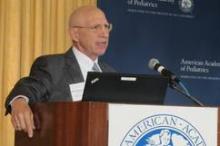WASHINGTON – The American Academy of Pediatrics is starting a new initiative that aims to help physicians, researchers, educators, legislators, and parents address the impact of toxic stress on children.
The Center on Healthy, Resilient Children will collect and disseminate the latest scientific evidence on brain health and development and ways to prevent toxic stress. It will also help pediatricians and others identify children who have experienced adversity and then steer them to appropriate supports.
Toxic stress is defined as strong, frequent, and/or prolonged adversity such as physical or emotional abuse, chronic neglect, caregiver substance abuse or mental illness, exposure to violence, and the accumulated burden of economic hardship, according to the Harvard University Center on the Developing Child.
Children in those situations who do not have adequate adult support can develop a prolonged activation of the stress response system, which can disrupt the brain’s development and increase the risk for stress-related disease and cognitive impairment, even into adulthood.
In 2012, the AAP outlined a call to action on toxic stress (Pediatrics 2012;129:e224-e231). The Center is a way to disseminate the policy and translate it into practice, said Dr. V. Fan Tait, AAP associate executive director, and director of its department of Child Health and Wellness. It will coordinate the work of all the AAP sections and committees, and reach out to government agencies and private organizations to help find the gaps, develop tools to address poverty, link with scientists, and encourage, also, said Dr. Tait, a pediatric neurologist.
"There needs to be a change in the climate, in our own communities, in our states, and in the way our nation approaches the antecedents of health issues and the antecedents of child wellbeing issues, which are all intimately connected," said Dr. Robert Block, a past president of the AAP who will serve as the medical director of the new center.
Intervening early will help foster an overall healthier society, he said.
"All adults once were children. Who we are, who the adults are, are heavily influenced by what happens in childhood," said Dr. Block, a professor of pediatrics at the University of Oklahoma.
To address toxic stress, pediatricians can first examine ecology of a child’s environment – that is, ask about family life or screen children who might be at high risk of adversity, he said.
There is no perfect screen right now, said Dr. Andrew Garner, chair of the AAP Early Brain and Child Development Leadership Work Group. Instead of focusing on the child’s behavior or dysfunction, pediatricians can "look upstream," said Dr. Garner of the department of pediatrics at Case Western Reserve University, Cleveland, and lead author of the toxic stress paper in Pediatrics.
Even if there is no specific intervention to offer, "We can always demystify, we can always destigmatize, and we can always provide support," Dr. Garner said.
Clinicians also need tools to help teach children the skills to adapt to stress "in a healthy manner as opposed to a maladaptive manner," he said. The goal is not to "put kids in a bubble," but to "actively build resilience."
The resiliency center will also promote the patient-centered medical home as a model to help pediatricians link to other health providers or resources that can aid their patients and families, said Dr. James Perrin, AAP president.
It is clear that the fee-for-service model won’t be the ideal for comprehensively addressing toxic stress, said Dr. Perrin.
Seeking payment for the additional effort may be in the cards, Dr. Tait added.
The center can help give pediatricians what they need to disrupt the handing down of behavioral and health care woes from generation to generation, said Dr. Perrin. "It’s an epic journey, it’s a critically important journey for all of us, and it begins today," he said.
On Twitter @aliciaault


